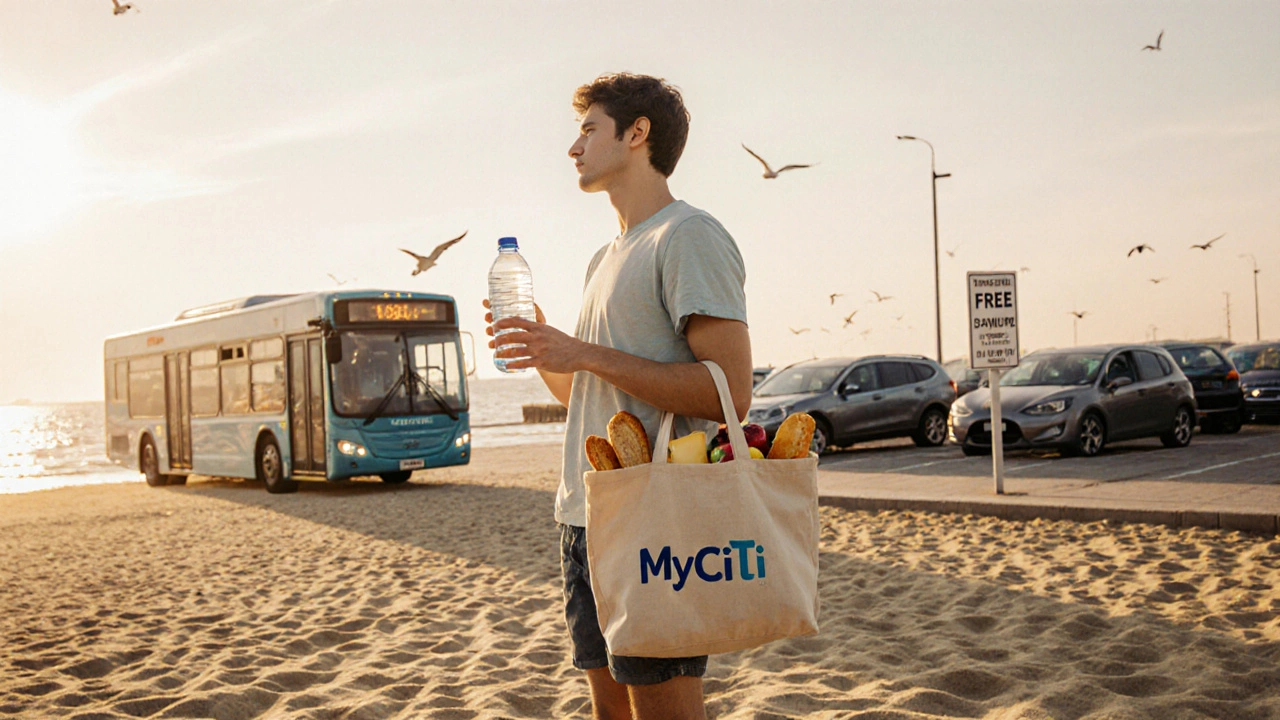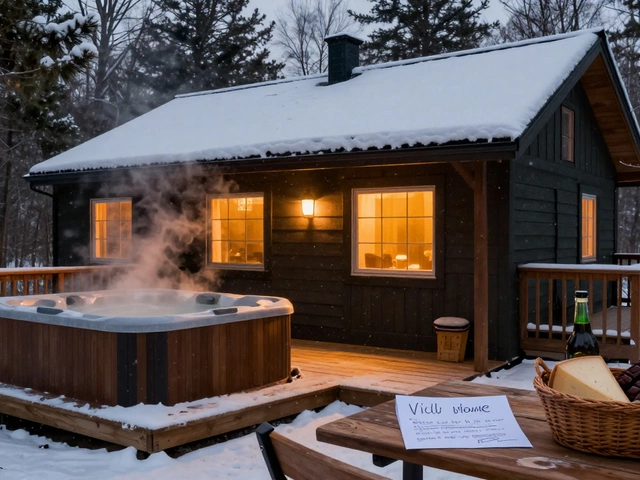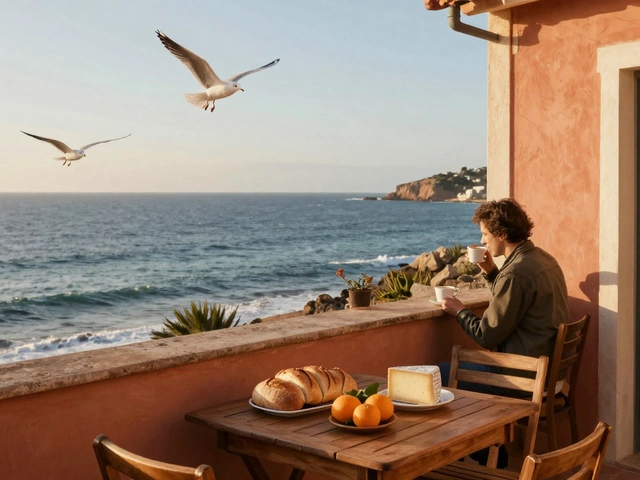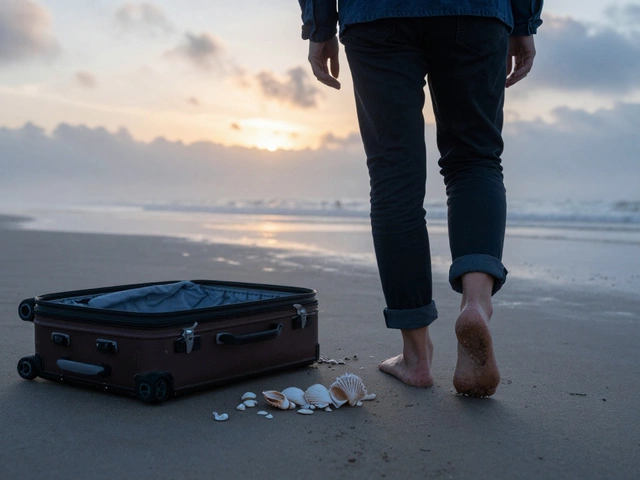Budget Beach Day Calculator
Plan Your Affordable Beach Day
When planning a cheap beach day is a budget‑friendly outing that maximizes fun while keeping costs low, the trick isn’t about skipping the good stuff-it’s about spotting the free or cheap parts that most travelers overlook.
Quick Takeaways
- Use public transport or rideshare pools to cut travel costs.
- Park in free municipal lots or arrive early for cheaper street parking.
- Bring a DIY picnic instead of pricey beachfront cafés.
- Take advantage of free water‑sport rentals, community events, and low‑cost lodging.
- Plan for off‑peak seasons when everything from accommodation to food drops in price.
1. Getting There Without Breaking the Bank
Transport is often the biggest line item. Here are three proven ways to keep it cheap:
- Public transport: Many coastal cities run regular buses or trains that stop within walking distance of the shore. In Port Elizabeth, the MyCiTi bus system offers a Beach Line daily service for under R30. Check the timetable online and buy a day pass to avoid single‑ticket fees.
- Rideshare pools: Apps like UberPool let you share a ride with other passengers heading the same direction. Splitting the fare can shave 40‑60% off a solo ride, especially during non‑rush hours.
- Free Beach parking municipal lots that cost nothing before noon: Some towns reserve the first two hours for free. Arrive early, park on the street, and you’ll save the parking fee entirely.
2. Parking Hacks for the Savvy Sun‑Seeker
Even when a beach charges for parking, you can often dodge the fee:
- Look for nearby residential streets that allow overnight parking; just be sure to read the signs.
- Use OpenStreetMap or Google Maps’ "Parking" layer to spot free lots a few blocks away.
- Some beaches offer a Parking discount for early birds before 9 am. Set your alarm, and you’ll pay a fraction of the regular rate.
3. Food on a Shoestring - DIY Beach Picnics
Eating out on the sand can quickly ruin a tight budget. Instead, turn the picnic into a mini adventure:
- Shop at Local markets where fresh produce and ready‑made salads cost half the price of tourist cafés. In Port Elizabeth, the Van Stadens Market has budget‑friendly fruit packs for under R20.
- Pack a sandwich kit: a baguette, sliced cheese, cured meat, and a drizzle of olive oil. Add a reusable water bottle to avoid buying pricey bottled water.
- Bring reusable containers and a small cooler. Ice packs are cheap at supermarkets and keep your drinks chilled for hours.
Don’t forget a simple dessert like a fruit salad or a packet of marshmallows-just toss them on a portable grill for a sweet treat.
4. Free or Low‑Cost Beach Activities
Sun, surf, and sand don’t have to be pricey. Here are activities that cost almost nothing:
- Free water sports: Many beach towns run community programs that lend out surfboards, kayaks, or paddleboards for free or a small deposit. Check the municipality’s recreation department website.
- Beach games: Pack a frisbee, a volleyball, or a set of sandcastle tools. These items are cheap at discount stores and provide hours of entertainment.
- Guided nature walks: Some coastal reserves host volunteer‑led tours that teach about local marine life and tidal pools. Usually free, they add value to your day.
- Sunset yoga: Look for local instructors who offer pop‑up classes on the sand; they often accept a small “tip‑jar” contribution.
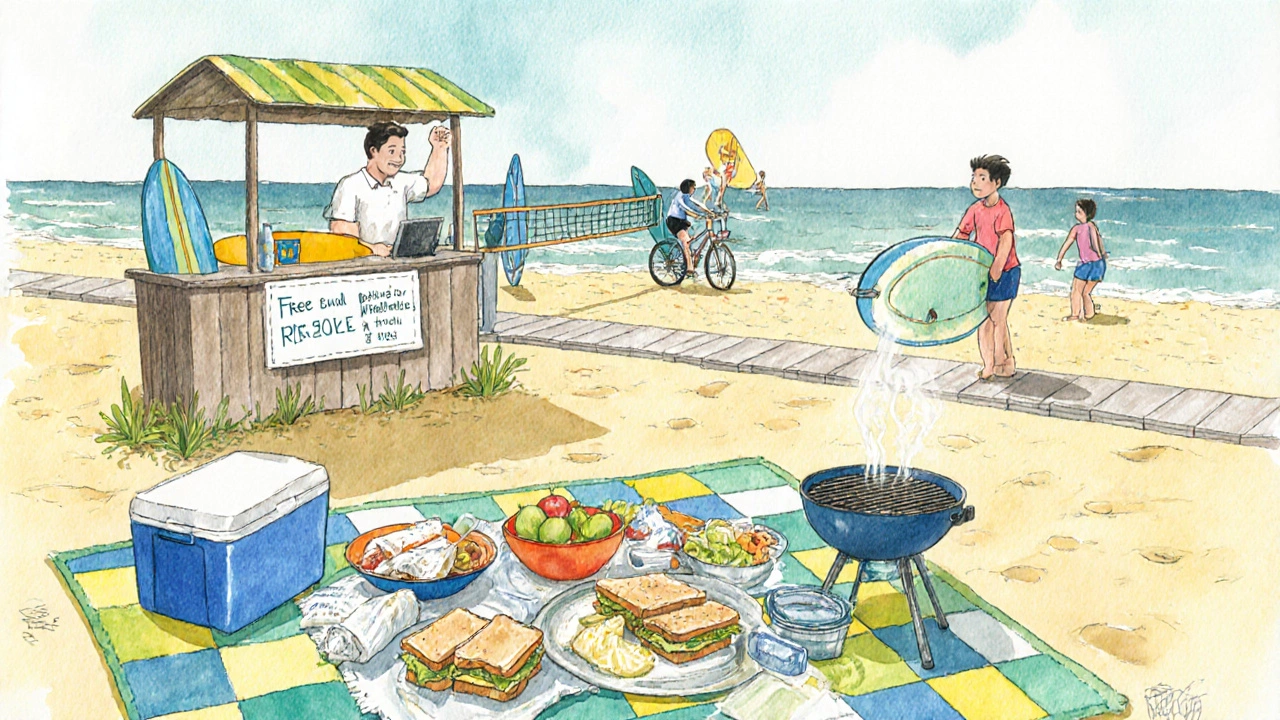
5. Finding Budget Accommodation Near the Shore
If an overnight stay is part of your plan, don’t assume beachfront hotels are the only option. Consider these alternatives:
- Hostels: Many coastal hostels provide shared dorm rooms for as low as $10‑$15 per night. Look for ones that offer kitchen access so you can cook your own meals.
- Camping: Public beach campsites often charge a nominal fee (around $5 per night) and give you direct access to the sand. Bring a portable tent and a sleeping bag-nothing more expensive than a night’s stay.
- Airbnb “room‑only” listings: Instead of renting an entire house, book a private room in a local’s home. Prices are usually 30‑40% lower, and you get insider tips on free activities.
6. Seasonal Discounts and Off‑Peak Planning
The time of year dramatically affects cost. Here’s how to use seasonality to your advantage:
- Shoulder season: Late spring (October‑November) and early autumn (March‑April) bring milder weather and lower prices. Beaches are less crowded, and local businesses often run promotions.
- Mid‑week stays: Hotels and hostels slash rates on Tuesdays and Wednesdays. Pair this with a mid‑week surf lesson for an even better deal.
- Public holidays: Some regions waive parking fees on national holidays. Check the local council calendar before you book.
7. Safety First - Free Resources That Protect Your Wallet
Saving money shouldn’t mean cutting corners on safety. Utilize free resources to stay secure:
- Local lifeguard stations: They post daily safety briefings and tide charts at no cost.
- Weather apps: Free apps like Windy or the South African Weather Service provide real‑time alerts on storms or high surf.
- Beach patrols: Some towns run volunteer beach clean‑ups that also distribute free sunscreen samples and first‑aid tips.
8. Sample Day Plan: From Dawn to Dusk on a Budget
Putting the tips together makes it easier to see the savings in action:
- 6:30 am - Catch the early MyCiTi bus to the main promenade stop. Walk 5 minutes to the free parking zone.
- 7:00 am - Set up a beach blanket, sip water from your reusable bottle, and do a quick sunrise stretch.
- 8:00 am - Unpack the picnic: baguette, cheese, fruit, and a homemade vinaigrette. Enjoy while watching the tide come in.
- 9:30 am - Join a free community surfboard lending program. Spend an hour catching waves.
- 11:30 am - Take a guided nature walk organized by the local marine reserve. Learn about tide pools and native fish.
- 1:00 pm - Return to your spot for a relaxed lunch. Refill water bottles at a nearby public drinking fountain.
- 3:00 pm - Play beach volleyball with other visitors. No equipment fee-just bring a ball.
- 5:30 pm - Sunset yoga session led by a volunteer instructor. Contribute a small tip if you enjoyed it.
- 6:30 pm - Head back to the bus stop and ride home, feeling refreshed and having saved roughly 60% compared to a typical resort day.

Comparison Table: Transport Options Cost Breakdown
| Transport Mode | One‑Way Cost | Round‑Trip Cost | Notes |
|---|---|---|---|
| MyCiTi Bus (day pass) | R15 | R30 | Runs every 15 min, stops near major beaches. |
| Rideshare Pool | R40 | R80 | Depends on demand; cheaper during off‑peak. |
| Private Car + Free Parking (early) | R50 (fuel) | R100 | Free municipal parking before 9 am. |
| Bicycle Rental | R20 | R40 | Eco‑friendly, great for short trips. |
Pro Tips to Stretch Every Rand
- Download offline maps before you go-no data roaming charges.
- Carry a small first‑aid kit; avoid buying emergency supplies on the beach.
- Check community bulletin boards for “free day” events, like beach clean‑ups that include free refreshments.
- Use a reusable tote bag for market purchases-many vendors give a discount for bag‑less shopping.
- Sign up for local tourism newsletters; they often share flash‑sale codes for parking or activities.
Frequently Asked Questions
What’s the cheapest way to get to a beach in South Africa?
Public transport, especially city buses like MyCiTi, usually costs the least. Look for free or discounted parking zones if you drive, and consider bike rentals for short distances.
Can I rent beach equipment for free?
Many coastal municipalities run community programs that lend surfboards, kayaks, or paddleboards for free or a refundable deposit. Check the local council website or ask at the beach information kiosk.
How can I avoid paying for beach food?
Pack a DIY picnic from a nearby market. Fresh fruit, bread, cheese, and a reusable water bottle cost a fraction of beachfront café prices and let you eat wherever you like.
Is it safe to swim without a lifeguard on duty?
Always check the local tide and surf reports. If you’re unsure, stick to areas with a lifeguard station or join a free community safety briefing before entering the water.
When are off‑peak rates the lowest?
Late October to early November and March to early April. Mid‑week days (Tuesday‑Thursday) also see the biggest discounts on accommodation and transport.
Next Steps
Pick a beach you’ve never visited, check the local bus schedule, and plan a one‑day picnic using the checklist above. The first time you try a cheap beach day, you’ll see how much fun you can have without spending a fortune. Keep this guide handy, and feel free to tweak the plan for your own city or favorite coast.

